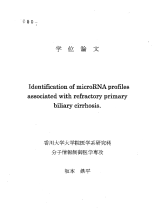Identification of microRNA profiles associated with refractory primary biliary cirrhosis
Access this Article
Author
Bibliographic Information
- Title
-
Identification of microRNA profiles associated with refractory primary biliary cirrhosis
- Author
-
坂本, 鉄平
- University
-
香川大学
- Types of degree
-
博士(医学)
- Grant ID
-
甲第690号
- Degree year
-
2018-03-24
Note and Description
AbstractMicroRNAs (miRNAs) are small, endogenous, non-coding RNAs that control the target gene translation by RNA interference; miRNAs are associated with cellular processes, including proliferation, differentiation, apoptosis, and cell survival. Primary biliary cirrhosis (PBC) is a chronic cholestatic liver disease of unknown etiology. One third of patients with PBC demonstrate suboptimal responses, which result in worse outcomes. It has been previously reported that miRNAs are involved in drug resistance, however, the association between miRNA expression levels and refractory PBC remains to be fully elucidated. In the present study, among the 20 patients with PBC treated with ursodeoxycholic acid or bezafibrate, 15 patients were classed as treatment‑effective, and 5 were classed as being treatment‑resistant. Using the miRNA array technique, miRNA profiles were identified for each group. A total of 35 miRNAs were significantly upregulated, and 23 were significantly downregulated in the treatment‑resistant group compared with the treatment‑effective group. In order to examine the association between the highly altered miRNAs and clinical features of the two groups, numerous parameters were analyzed. Elevated levels of direct bilirubin, aspartate transaminase (AST), and alanine transaminase (ALT) were identified to be associated with miRNA‑122 upregulation. AST, ALT, and γ guanosine triphosphate were additionally associated with miRNA‑378f upregulation. However, the reduction of miRNA‑4311 was associated with reduced levels of AST and ALT. miRNA‑4714‑3p was also negatively correlated with total bilirubin and lactate dehydrogenase. Therefore, identifying the miRNA profile was demonstrated to be a useful approach in the characterization of PBC development. It is suggested that highly altered miRNAs may be potential biomarkers for use in the development of treatment of patients with refractory PBC.
Abstract MicroRNAs (miRNAs) are small, endogenous, non-coding RNAs that control the target gene translation by RNA interference; miRNAs are associated with cellular processes, including proliferation, differentiation, apoptosis, and cell survival. Primary biliary cirrhosis (PBC) is a chronic cholestatic liver disease of unknown etiology. One third of patients with PBC demonstrate suboptimal responses, which result in worse outcomes. It has been previously reported that miRNAs are involved in drug resistance, however, the association between miRNA expression levels and refractory PBC remains to be fully elucidated. In the present study, among the 20 patients with PBC treated with ursodeoxycholic acid or bezafibrate, 15 patients were classed as treatment‑effective, and 5 were classed as being treatment‑resistant. Using the miRNA array technique, miRNA profiles were identified for each group. A total of 35 miRNAs were significantly upregulated, and 23 were significantly downregulated in the treatment‑resistant group compared with the treatment‑effective group. In order to examine the association between the highly altered miRNAs and clinical features of the two groups, numerous parameters were analyzed. Elevated levels of direct bilirubin, aspartate transaminase (AST), and alanine transaminase (ALT) were identified to be associated with miRNA‑122 upregulation. AST, ALT, and γ guanosine triphosphate were additionally associated with miRNA‑378f upregulation. However, the reduction of miRNA‑4311 was associated with reduced levels of AST and ALT. miRNA‑4714‑3p was also negatively correlated with total bilirubin and lactate dehydrogenase. Therefore, identifying the miRNA profile was demonstrated to be a useful approach in the characterization of PBC development. It is suggested that highly altered miRNAs may be potential biomarkers for use in the development of treatment of patients with refractory PBC.


